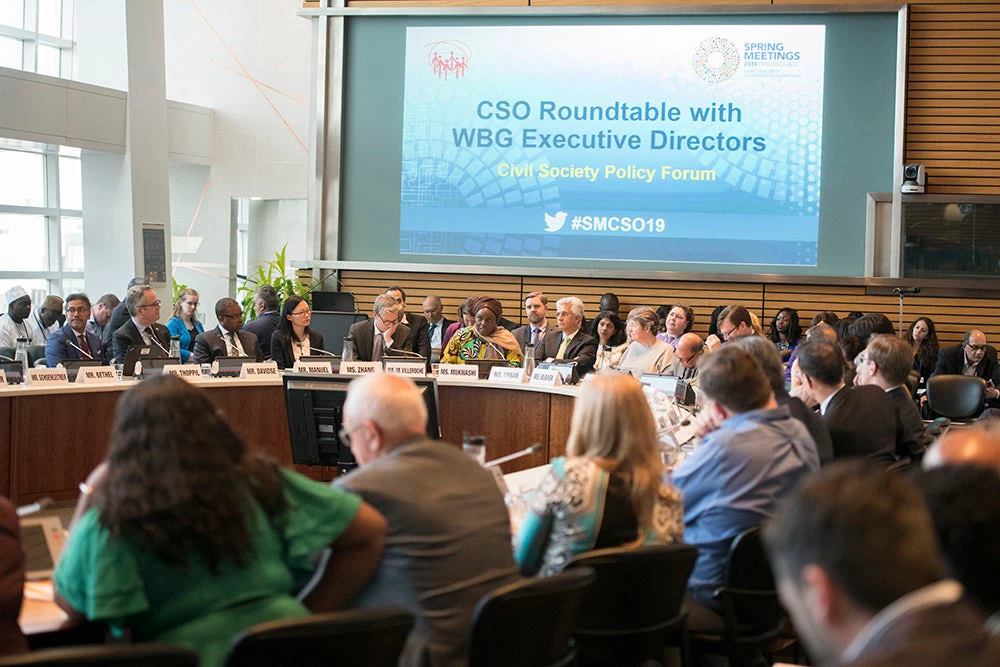 © World Bank
© World Bank
As Chief Executive of Christian Aid, I was honored to co-moderate a round-table discussion between global Civil Society Organizations (CSOs) and Executive Directors (EDs) of the World Bank at the Spring Meetings in Washington last month.
As I said in my opening remarks, while we couldn’t expect to solve all the world’s problems, we could expect a candid and inclusive discussion. Several hundred civil society participants packed the Board Room and overflow rooms outside, joined, crucially, by an unprecedented number of EDs, or their representatives, with 24 out of 25 offices participating.
To shape the discussion, my co-moderator, Dean Merza Hasan, and I agreed on five themes:
• Civil Society Space
• Debt
• Climate Change
• Inequality, Disability and Health
• Fragility, Conflict and Violence (FCV)
Overall, I was delighted to see real engagement from civil society in asking difficult questions at the roundtable – and I was also pleased with what I saw as genuine engagement from the EDs.
Starting with civil society space, the questions began with the Bank’s role working with governments curbing CSO participation. UK ED, Richard Montgomery, stressed that it was difficult for the Bank to publicly question a sovereign parliament, in this case Nigeria. I pointed out there were worrying trends across the world and added that other actors, including the private sector, could influence these Governments.
On debt, the EDs were asked what the Bank was doing to support countries in debt crisis. Italian ED Patrizio Pagano stressed that ‘not all debt is equal’ and distinguished between sustainable and less sustainable levels of debt.
I was gratified to note that there were lively questions on the increasingly urgent issue of climate change. Nordic ED Susan Ulbaek referred to climate change as “a locomotive that is moving” and the Bank “would not be left behind.”
Despite this optimistic note, I was keen to receive concrete assurance that the WB would remain committed to the Paris agreement and was happy to receive an affirmative confirmation from several of the EDs present.
On inequality, disability and health, it was good to hear from a deaf contributor representing millions of deaf people in Africa, as well as other questions on sight-related and other disabilities. ED Montgomery pointed out that for the first time ‘disability’ would be explicitly referred to in the WB’s official Spring Meeting communique and that the Bank ‘is stepping up its commitments.’
There were several references by EDs to ‘human capital’ boosting productivity along with the need to ‘speak the language’ of financial representatives of governments. I mentioned I would like to change that dynamic since the global economic system is not delivering for the world’s poorest and progress is far too slow. If we continue to do what we have always done, I argued, we will continue to get what we have always got, and that is not good enough. I urged a human-centric approach, which the Dean acknowledged as a good point.
On FCV, we heard from several committed peace campaigners about the need to reduce arms spending and put an end to violence. The EDs acknowledged countries’ legitimate need for effective security, but ED Pagano agreed that “there is a very clear correlation between fragility and poverty.”
At the end of our discussion, I felt compelled to turn to the issue of WB governance. The recent WB presidential recruitment process left a lot of CSOs disappointed and was a ‘missed opportunity’ to show the Bank’s commitment to diversity. I acknowledged that there are ongoing ‘power dynamics’ but we must start working now to change that process. I was heartened to hear support from my civil society peers and look forward setting this new approach in motion when the IMF starts its presidential appointment process in 18 months.


Join the Conversation